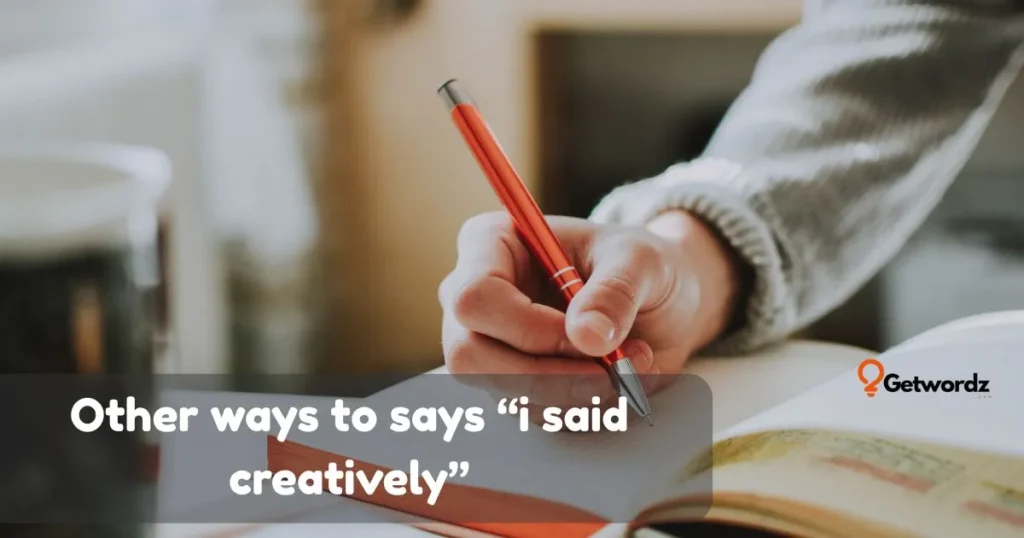Ever catch yourself typing “I said” over and over again in a text, story, or conversation and thinking “There has to be a better way to say this”? You’re not alone. The phrase “I said” is simple, but it’s also one of the most overused expressions in everyday language.
Whether you’re chatting with friends, drafting dialogue for a story, or explaining something to a coworker, repeating “I said” can make your words feel flat or lifeless.
That’s exactly why people search for creative alternatives to “I said.” Fresh wording adds emotion, style, and personality, turning an ordinary line into something that feels alive and real. Imagine saying “I insisted,” “I whispered,” “I teased,” or even “I confessed.”
Each phrase paints a different picture and helps your message hit the right tone, whether it’s serious, funny, romantic, or professional.
In this post, you’ll discover dozens of unique expressions, clever phrases, and better ways to say “I said” that bring your words to life. Perfect for writers, students, professionals, or anyone who wants their communication to feel more natural and engaging.
✨ Keep reading because your next favorite way to say “I said” might just become your new go-to phrase.
1. I Whispered
Scenario: Imagine telling your friend a secret during class or sharing a sweet moment with your partner. Instead of just saying “I said,” you could say “I whispered” to show a softer, more intimate tone.
Explanation: “I whispered” is a creative alternative to “I said” that adds subtle emotion and atmosphere. It’s perfect when you want your dialogue to feel quiet, caring, or secretive.
Examples:
- I whispered, “You’ve got this,” right before she went on stage.
- “Don’t tell anyone,” I whispered as we laughed.
- I whispered his name, hoping he’d still hear me.
Why It Works: This phrase stands out because it instantly creates a mood. It shows volume and emotion, helping readers imagine the scene more vividly.
2. I Explained
Scenario: When you’re clarifying something at work, school, or even in a text conversation, “I explained” sounds more precise and thoughtful.
Explanation: “I explained” is a better way to say “I said” when you’re describing how you gave information clearly or patiently. It adds logic and confidence to your tone.
Examples:
- I explained the plan so everyone could understand.
- “That’s not what I meant,” I explained with a smile.
- I explained why the meeting was so important.
Why It Works: It sounds professional and intentional, making it perfect for both formal and casual contexts.
3. I Replied
Scenario: In a chat or quick exchange, you might not just “say” something , you reply. This phrasing feels natural in both text and dialogue.
Explanation: “I replied” is a simple yet polished alternative that fits modern communication, especially in emails or messages.
Examples:
- “Sure thing,” I replied.
- I replied to her text with a thumbs-up emoji.
- “I’ll handle it,” I replied confidently.
Why It Works: It’s concise and modern, showing action and responsiveness without overcomplicating your tone.
4. I Announced
Scenario: When you’re sharing exciting news, like a job promotion or engagement, “I announced” feels bold and expressive.
Explanation: This unique expression adds power and celebration, making it ideal for moments when your words carry excitement or authority.
Examples:
- I announced my promotion with a grin.
- “We’re engaged!” I announced proudly.
- I announced the winner to the cheering crowd.
Why It Works: It conveys confidence and importance, helping your statement feel
larger than life.
5. I Murmured
Scenario: Think of a cozy late-night talk or a sleepy conversation , that’s when “I murmured” fits perfectly.
Explanation: “I murmured” is a soft, emotional alternative that evokes tenderness, exhaustion, or intimacy.
Examples:
- “I’m so tired,” I murmured into my pillow.
- I murmured her name as she drifted off.
- “Goodnight,” I murmured quietly.
Why It Works: This phrase paints a picture of closeness and calm, adding emotional texture to your dialogue.
6. I Remarked
Scenario: When you’re making a casual or witty observation, “I remarked” gives your dialogue a polished twist.
Explanation: It’s a more articulate alternative to “I said” that shows thoughtfulness or humor.
Examples:
- “That’s quite the coincidence,” I remarked.
- I remarked how beautiful the sunset looked.
- “You’re early for once,” I remarked playfully.
Why It Works: It’s conversational yet elevated, perfect for storytelling or creative writing.
7. I Shouted
Scenario: During a heated game or argument, “I shouted” adds energy and emotion.
Explanation: “I shouted” is a dynamic replacement that captures strong emotion , excitement, anger, or urgency.
Examples:
- “Run!” I shouted as the rain poured.
- I shouted over the loud music.
- “That’s amazing!” I shouted with joy.
Why It Works: It instantly adds volume and energy, turning flat dialogue into an action scene.
8. I Suggested
Scenario: When offering advice or sharing an idea, “I suggested” sounds thoughtful and respectful.
Explanation: A creative alternative that signals collaboration or consideration, perfect for polite discussions.
Examples:
- I suggested we take a break.
- “Maybe try this approach,” I suggested.
- I suggested a different route to avoid traffic.
Why It Works: It makes your tone sound cooperative and intelligent without being forceful.
9. I Reassured
Scenario: When comforting someone who’s anxious or upset, “I reassured” expresses warmth and empathy.
Explanation: This gentle phrasing conveys emotional intelligence, ideal for personal conversations.
Examples:
- I reassured her that everything would be fine.
- “You’re doing great,” I reassured softly.
- I reassured my friend with a calm smile.
Why It Works: It builds trust and shows care, making your tone emotionally resonant.
10. I Admitted
Scenario: When you finally open up about something, “I admitted” shows honesty and vulnerability.
Explanation: “I admitted” is a real, relatable alternative that communicates authenticity.
Examples:
- I admitted I was wrong.
- “I miss you,” I admitted quietly.
- I admitted my mistake and apologized.
Why It Works: It adds depth and honesty, making your dialogue feel genuine.
11. I Responded
Scenario: Perfect for structured conversations or when recounting formal exchanges.
Explanation: “I responded” is a neutral yet professional alternative, commonly used in writing or interviews.
Examples:
- I responded quickly to his message.
- “I’ll look into it,” I responded politely.
- I responded with a brief explanation.
Why It Works: It fits well in both business and narrative writing, showing responsiveness and tone control.
12. I Complained
Scenario: When expressing frustration or annoyance, “I complained” sets the mood perfectly.
Explanation: It’s a direct, emotional choice that adds realism to casual dialogue.
Examples:
- I complained about the long line.
- “This coffee’s cold,” I complained.
- I complained, but he just laughed.
Why It Works: It adds character personality and emotional nuance, keeping dialogue believable.
13. I Confirmed
Scenario: When verifying details or giving assurance, “I confirmed” sounds clear and professional.
Explanation: A smart substitute for formal or confident communication.
Examples:
- I confirmed the appointment by email.
- “Yes, that’s correct,” I confirmed.
- I confirmed our plans for Saturday.
Why It Works: It conveys precision and reliability , perfect for work or professional tone.
14. I Insisted
Scenario: When you want to express determination, “I insisted” shows persistence and emotion.
Explanation: This strong expression adds intensity and conviction.
Examples:
- “You have to come,” I insisted.
- I insisted on paying for dinner.
- I insisted that it was the right choice.
Why It Works: It shows passion and confidence, giving your words power.
15. I Wondered
Scenario: When reflecting or expressing curiosity, “I wondered” adds thoughtfulness.
Explanation: It’s a reflective, creative alternative that fits narrative or introspective writing.
Examples:
- I wondered what he was thinking.
- “What if we tried again?” I wondered.
- I wondered how things might change.
Why It Works: It reveals inner dialogue, helping readers connect emotionally.
Read More: 30 Other ways to say “Mark your Calendar” with Examples!
16. I Joked
Scenario: When you’re teasing a friend or making light of a situation.
Explanation: A fun and casual alternative that adds humor and friendliness.
Examples:
- “Don’t quit your day job,” I joked.
- I joked about my terrible cooking.
- “You wish,” I joked playfully.
Why It Works: It lightens the tone and shows personality, perfect for casual exchanges.
17. I Begged
Scenario: When you’re desperate or pleading, “I begged” instantly adds drama.
Explanation: A powerful, emotional phrasing that communicates urgency or deep feeling.
Examples:
- “Please stay,” I begged.
- I begged him to give me one more chance.
- “Don’t go,” I begged, tears forming.
Why It Works: It creates intensity and empathy, drawing readers into the emotion.
18. I Teased
Scenario: When joking with someone you’re close to, “I teased” feels playful and personal.
Explanation: It’s a flirty or lighthearted replacement for “I said.”
Examples:
- “You like me,” I teased.
- I teased him for being late again.
- “You can’t resist,” I teased with a grin.
Why It Works: It adds charm and realism, making dialogue fun and engaging.
19. I Noted
Scenario: When making an observation or recording a fact.
Explanation: “I noted” is a professional and precise alternative, ideal for formal writing.
Examples:
- I noted her hesitation.
- “Interesting,” I noted quietly.
- I noted that the numbers had changed.
Why It Works: It’s calm, confident, and analytical , great for essays or reports.
20. I Promised
Scenario: When giving your word or offering comfort.
Explanation: This heartfelt alternative conveys trust and sincerity.
Examples:
- “I’ll always be here,” I promised.
- I promised I’d call when I got home.
- “You can count on me,” I promised.
Why It Works: It builds emotional connection and strengthens trust.
21. I Observed
Scenario: When you’re describing a thoughtful or analytical moment, “I observed” adds a reflective and attentive touch.
Explanation: This refined alternative to “I said” works beautifully in storytelling or professional communication where attention to detail matters.
Examples:
- I observed how calm she remained under pressure.
- “You seem distracted today,” I observed.
- I observed the changes in his tone carefully.
Why It Works: It emphasizes awareness and mindfulness, making your dialogue or writing sound intelligent and composed.
22. I Announced
Scenario: When you’re sharing news, excitement, or an important statement, “I announced” captures authority and enthusiasm.
Explanation: A bold, confident replacement for “I said”, it works best for declarations or official moments.
Examples:
- I announced my decision to the team.
- “We’re moving!” I announced happily.
- I announced the final results with pride.
Why It Works: It projects confidence and emotion, giving your dialogue power and presence.
23. I Recalled
Scenario: When sharing a memory or past experience, “I recalled” instantly creates a nostalgic or reflective tone.
Explanation: This creative expression adds emotional depth and helps transition between past and present moments in writing.
Examples:
- I recalled our first trip together.
- “You used to love this song,” I recalled softly.
- I recalled how nervous I was that day.
Why It Works: It adds richness and introspection, connecting readers emotionally through memory.
24. I Warned
Scenario: When giving advice or cautioning someone, “I warned” conveys seriousness and care.
Explanation: It’s a firm yet empathetic alternative that adds urgency to your tone.
Examples:
- I warned her not to touch the stove.
- “Be careful out there,” I warned.
- I warned him about the risks ahead.
Why It Works: It shows authority mixed with concern, making your dialogue both realistic and emotionally charged.
Read More: Other Ways to Say “You got this” with Examples!
25. I Inquired
Scenario: When asking questions politely or professionally, “I inquired” sounds elegant and formal.
Explanation: This polished alternative works perfectly for business, journalism, or thoughtful storytelling.
Examples:
- I inquired about the available options.
- “May I ask what happened?” I inquired gently.
- I inquired if the position was still open.
Why It Works: It adds sophistication and professionalism, ideal for more refined writing styles.
26. I Repeated
Scenario: When emphasizing or restating a point, “I repeated” adds rhythm and patience to your communication.
Explanation: A simple yet effective expression, it fits both everyday dialogue and narrative writing.
Examples:
- I repeated the directions so he wouldn’t forget.
- “I said no,” I repeated firmly.
- I repeated my question with a calm tone.
Why It Works: It conveys persistence and emphasis, showing control and purpose in how you speak.
27. I Agreed
Scenario: When aligning with someone’s opinion or decision, “I agreed” reflects harmony and understanding.
Explanation: This friendly, cooperative phrasing replaces “I said” in moments of mutual respect or positivity.
Examples:
- I agreed that it was the best choice.
- “You’re right about that,” I agreed.
- I agreed to help him with the project.
Why It Works: It highlights collaboration and warmth, creating a tone of unity in any conversation.
28. I Questioned
Scenario: When expressing doubt or curiosity, “I questioned” adds an analytical or skeptical tone.
Explanation: A thoughtful alternative to “I said”, it’s perfect for dialogues that explore uncertainty or discovery.
Examples:
- I questioned whether it was the right time.
- “Are you sure?” I questioned gently.
- I questioned the logic behind the plan.
Why It Works: It brings curiosity and tension into your dialogue, making your writing feel dynamic and engaging.
29. I Remarked
Scenario: When you’re making a clever or observant comment, “I remarked” adds character and wit.
Explanation: This creative expression blends casualness with confidence, great for both personal and professional use.
Examples:
- “That’s quite impressive,” I remarked.
- I remarked on how peaceful the room felt.
- “Looks like someone’s been busy,” I remarked playfully.
Why It Works: It helps your tone feel sharp, articulate, and engaging without sounding repetitive.
30. I Confessed
Scenario: When revealing a secret, truth, or deep emotion, “I confessed” makes the moment more vulnerable and real.
Explanation: It’s a heartfelt, emotional alternative that adds honesty and human depth to your dialogue.
Examples:
- “I was scared,” I confessed quietly.
- I confessed my mistake and felt relieved.
- “I’ve loved you all along,” I confessed.
Why It Works: It makes your words feel raw and authentic, building trust and emotional connection with your audience.
Pros✅of Using I Said Creatively
Pros✅
- ✅ Enhances expression and tone
Using creative alternatives to “I said” helps convey emotion, personality, and intent more clearly in both writing and speech. - 🎨 Improves storytelling quality
It makes dialogue richer and helps readers visualize scenes while connecting deeply with characters or emotions. - 📈 Boosts SEO visibility
The phrase “I Said Creatively” attracts users searching for creative writing tips, unique expressions, and better wording ideas. - 🌍 Appeals to diverse audiences
Works perfectly for writers, students, professionals, and content creators looking to sound more authentic and engaging. - 💡 Encourages language variety
Expands your vocabulary and prevents repetitive phrasing, keeping your communication fresh and memorable.
Cons⚠️
- ⚠️ Risk of overcomplication
Overusing alternatives can make writing feel forced or unnatural if not balanced properly. - 🤔 Possible context mismatch
Some alternatives don’t fit every tone or situation, which may confuse readers if used incorrectly. - 📉 SEO competition
Creative writing keywords often face high search competition, requiring strong optimization and originality. - 😅 Reader distraction
Too many stylistic phrases might pull focus away from the story or main message. - 📚 Learning curve
Beginners may need practice to understand when and how to use each creative phrase effectively.
Closing words
Finding better ways to express yourself can completely transform your communication. This post on I Said Creatively shared fresh, expressive alternatives that help you avoid repetitive and overused phrases while making your words more engaging and genuine. These creative expressions give your messages more depth, confidence, and style.
Whether you’re talking with friends, writing to colleagues, crafting a heartfelt note, or posting on social media, these unique expressions and creative alternatives fit naturally into any context.
Try one of these phrases in your next message or caption to make your words stand out. Using these different ways to say “I said” adds authenticity, warmth, and impact to your communication. Keep expressing yourself with confidence through I Said Creatively and let your words leave a lasting impression.




